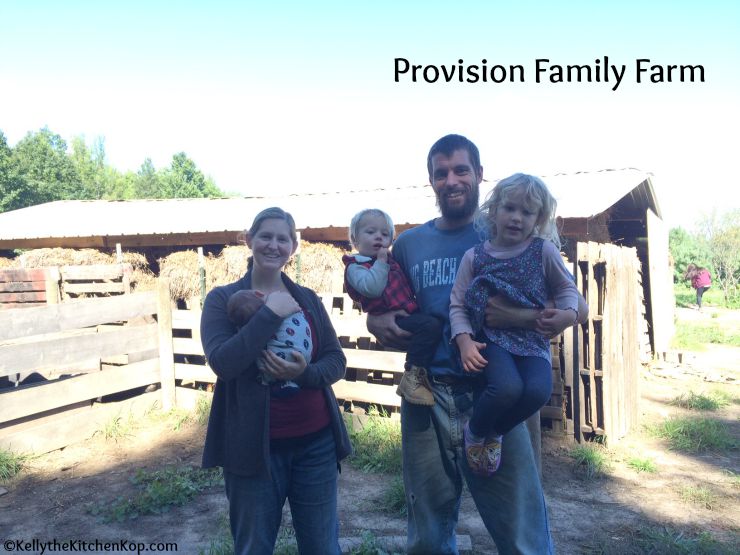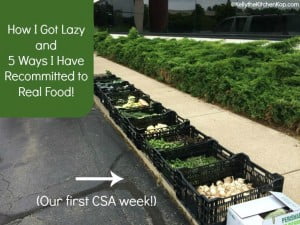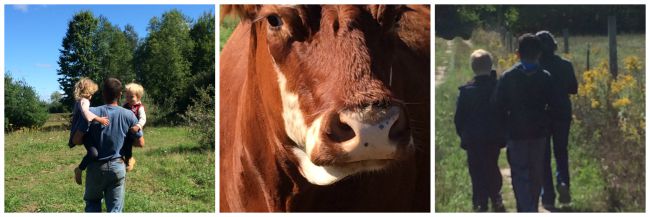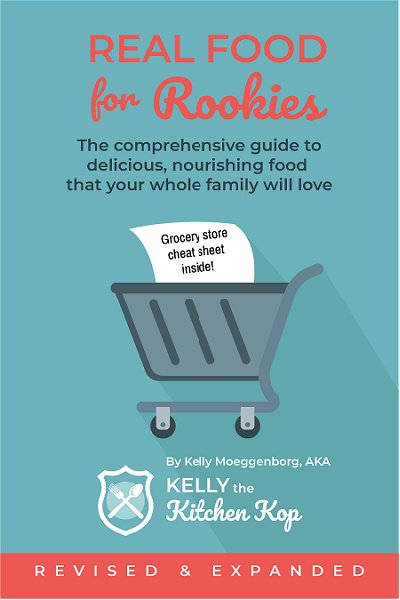
Recently I shared this post with you: One question you MUST ask your farmer, and I wanted to show you the email exchange between our farmer and I when I asked HIM that question…
First, a little back-story:
A while back I told you how I was recommitting to REAL FOOD around here — read about what actually got me back on track and how transparency is so important: How I Got Lazy and the 5 Ways I Have Recommitted to Real Food and Healthy Eating.
One of the things I mentioned recommitting to is the issue of healthy meat:
Only buy meat from farms I have personally visited where I can see the animals and talk to the farmer face-to-face.
So I started asking around and visiting farms. (If you are too busy to go search out farms or can’t find good sources for pastured meats near you, here’s where I recommend for ordering safe, healthy meat online. I do know and trust the owner there, so if you can’t go visit the farms, this is second best, but especially after reading this post, I really hope you WILL get out there and do some research on what's available to you locally.)
 A great farm we found, the family pictured above, is Provision Family Farm. Luke and Caitlin, along with Luke's parents, run the farm, and they're doing everything right — Luke has learned a ton from the same source where he got his initial inspiration to start farming: yep, Joel Salatin. (I wonder how many of us have him to thank for having local REAL food sources?!) I love what Joel says here about how things are changing: “It’s really weird to be the ugly step-child for all those early years and then you wake up one day and you’re Cinderella. To be sure, we haven’t won this by any means, but it’s really amazing to see this.” Read more here about Joel Salatin and find more links about him there, too. Here are a few of my favorite pictures from our farm visit:
A great farm we found, the family pictured above, is Provision Family Farm. Luke and Caitlin, along with Luke's parents, run the farm, and they're doing everything right — Luke has learned a ton from the same source where he got his initial inspiration to start farming: yep, Joel Salatin. (I wonder how many of us have him to thank for having local REAL food sources?!) I love what Joel says here about how things are changing: “It’s really weird to be the ugly step-child for all those early years and then you wake up one day and you’re Cinderella. To be sure, we haven’t won this by any means, but it’s really amazing to see this.” Read more here about Joel Salatin and find more links about him there, too. Here are a few of my favorite pictures from our farm visit:

What I love about Luke and Caitlin (and others like them) is their transparency. They can talk intelligently with me about the problems facing consumers and farmers, and they're honest. We know that it's not always simple providing real food to customers, there are struggles and dilemmas when they're just starting out and different types of issues as they grow, but we just want communication and the truth, that's what we as consumers need and deserve.
What Knowing Your Local Farmer Looks Like
So when I learned the One question you MUST ask your farmer, I knew I could email Luke:
Hi Luke, I'm sure I've asked you this before, but have to double check: you don't spray your crops or feed the animals sprayed crops, right? See my recent post below for more about why I'm asking. (I linked to the “one question” post.)
This was Luke's reply:
Kelly,
So, spraying pastures is the new height of ludicrous. I assure you that I never spray any such thing. EVER.
You asked though, about whether I sprayed crops or fed sprayed crops. Its not a simple answer, but I'll do my best to give an honest and clear answer.
We have no chemicals on the farm. Never have never will. So we don't spray our crops. We don't worm out sheep and cattle (unlike many other “natural” producers). No hormones, no antibiotics. I have at times used Fertell's organically certified mineral mix which includes synthetic vitamins (like many of the ones we take). These days I switched to just kelp and salt as a mineral supplement.
I buy grains from an Amish mill in Fremont. We know them quite well. They buy non-gmo corn from 2 farmers in the area, and we mix a feed including corn, flax, wheat and rice milling byproducts, alfalfa and some others. We also hand mix spent brewing grains in our feed.
There are only two potential gm crops in that list, the Corn, which I take his word on, and the alfalfa pellets, which I looked at the bag and called the company.
However, non-gmo is not organic. There are sprays applied to many or most of those crops. Obviously not roundup, but other unpleasant chemicals. Even organic approved pesticides can be pretty harsh.
I asked our Amish farmer about it, and he will check with the farmers, but most likely, the farmers use the standard practice of an early application of broadleaf killer such as atrazine, after which the corn will out-compete almost everything. So, an herbicide is applied 3-5 months before harvest. Corn doesn't normally need pesticides or fungicides.
Broadleaf herbicides are known endocrine disruptors. Looking at them online, I concluded we are probably exposed to more in the groundwater than in vegetable and grain crops, and those having further passed through an animal are probably even smaller. I don't condone or prefer it, but it seems fairly minute.
There are certainly additional chemicals involved in some of my smaller ingredients, but I do what I can (for example I have returned a number of kinds of oil byproducts when I found they were chemically instead of expeller expressed.)
Let me know what you think.
Now I'm just a city girl, so I wasn't exactly sure what to think, so at first, I just replied this to Luke:
I'm still chewing on all of this, but right now I just want to say…
You ROCK!
I so appreciate your honesty & transparency!!!!!!! That means so much to me!!
And then I forwarded the email to Edwin, the farmer where I originally learned about the “one question”, and here's what he said:
Good morning Kelly!
As for your farmer’s answers… He sounds like a very high integrity farmer. You should be proud of him and support him every way that you can. I’m sure you are and do. I particularly like his total transparency in telling you up front that he does the best he can even though a few of the outside inputs that he cannot control are less pure/chemical free than he would like or than he would do if he controlled all that himself. This is the real world. He is being diligent to the best of his ability. Many sustainable farmers are on a journey and he is being truthful about where he is in his journey.
The reason why it is so important to support these kind of farmers in their journey is that with proper support, it’s quite possible there will come a day when he can afford to own and manage the land that grows all of his crops. That way he’ll have full control over those things which he now is dependent on the commitment of others.
I would not be worried as far as your health is concerned. I would not and do not use any chemicals and neither does he so… I think we all agree that the perfect solution would be to use no chemicals.
But there is a huge difference between the application he describes and what I describe in Double Agent (the “one question” post). The difference is this: GrazonNext HL is knowingly and intentionally applied directly to to the portion of the crop the cows are immediately eating. Atrazine is only applied to the field before the corn starts to grow. The corn is then harvested 3-4 months later. The important difference is that the corn does NOT have chemical applied directly to it. Big difference. And even the chemical that was applied was 3-4 months before the animals could eat the corn. Also a big difference. Your farmer is not defending chemical application of any kind. But he is honestly admitting that he lives in the real world and this is a real life possibility since we do not yet live in a chemical free world…but this is still a far far cry better than the GrazonNext Hl scenario.
Just be sure your readers know that I’m not defending crop chemical use…we do not use any crop chemicals period on our 300 certified organic acres and haven't for over 10 years. (We have another 200 acres in the works to be certified in the next few years.) I’m just trying to be sympathetic to farmers that are in a process of working away from the worst offenders like, GMO’s, BT toxin traits, Neonicotinoids, Roundup Ready, etc.
Got to encourage the good where you find it. Never let the perfect be the enemy of the good!
So…that’s basically my impression Kelly. Not sure it that’s what you were looking for or not but, yes, I like what I see in his answers. He’s remarkable…hang on to him!
So I asked Luke:
I have a question for you…
Could I use your replies in a post to teach my readers what it means to KNOW their farmer, and know that they have integrity like you do and to expect the awesome honesty and transparency that you have with me????
Luke replied:
Of course. I believe that regulations (e.g. organic certification) can never be as effective as transparency and relationships; because rules create both loopholes and incentivize the lowest allowable quality (quite apart from intentional duplicity).
One more little note:
As much as we love Luke and Caitlin, it doesn't mean everything is always rosy. Sometimes their chicken has been too tough, and my friend doesn't like their sausage seasoning (we love it!), but these are just examples of things to discuss with your farmer and another reason you need to have a friendly relationship with them. They want to hear from you so they can grow and become better at what they do! You also want to maintain this relationship so as they grow, you can keep asking questions. This way they won't be tempted to make compromises later or for quality to decline as the quantity they're dealing with goes up, as often happens when small farmers get much bigger.
How to help your local farmer grow and thrive!
Once I found Luke and Caitlin through the recommendation of a friend (thanks Sarah), I wanted them to be successful so my source for healthy meat stayed available! So I did something that was VERY easy, it was convenient for me, helped many of my friends, AND is helping Luke and Caitlin grow their business:
I set up a monthly local meat and eggs drop a mile from our house in a grocery store parking lot!
All I did was ask all my friends who wanted to be on my email drop list, and then once a month I'll get an updated price and availability list from the farm and send out an email reminder that looks like this (takes less than 5 minutes):
Hey friends, this is your reminder of our monthly pastured meat drop. Please email your order TO LUKE & CAITLIN by Monday night (their email here):
Pick up will be on (day) — always the (? day of the month, date and time) in the (place) parking lot in the SE corner — look for a (describe their vehicle here).
Price/availability list is below.
—If you'd like to be OFF this monthly reminder email list, let me know.
—If you know someone who would like to be ADDED to this list, let me know that, too.Thanks & stay diligent and aware of what's in your food!
KellyHere is a current price list and info from PROVISION FAMILY FARMS…
Now YOU go out and be the one in your area to do a little research and set up a drop point!
If you're wondering where to find a good local farm, your local Weston Price chapter is a great place to start. (Our local site for the Grand Rapids, Michigan chapter is here.)
One more way you can help your farmer: Talk about him when you go to local restaurants and encourage them to add one or two menu items for those who want to avoid mystery meat. (You may not want to say it like that, though…) Also talk about them to your local butcher and at meat markets, too.
Be the one to help make a difference in your farmers' life and in the lives of those you love!
Watch this video with my local farmer (plays after the ad):
- Posts like this, as well as researching into local farms, is SO worth it, but does take a lot of time. If you are shopping on Amazon, I'd appreciate you doing so through this link or if you are shopping for other items doing so through the links on my shop page — there's no cost difference for you, it just helps support the blog so I can keep going, and thank you! You might also buy my book: Real Food for Rookies!
- Another huge way to help your farmer is by becoming a member of the Farm to Consumer Legal Defense Fund — they FIGHT for farmers' rights to continue to grow the nutrient-dense foods we all want!
- As I said above, if you are too busy to go search out farms or can’t find good sources for pastured meats near you, here’s where I recommend for ordering safe, healthy meat online. I do know and trust the owner there, so if you can’t go visit the farms, this is second best, but especially after reading this post, I really hope you WILL get out there and do some research on what's available to you locally.



Tina~ says
Hi Kelly,
So…if I read this correctly, he is feeding corn to the cattle or is the corn portion only for the chickens?
I also wanted to touch on your comment regarding the sausage spice mix. Often you have farmers that farm cleaner than clean…like your friend who has an organic farm. They control all the inputs, grow chemical free etc. Then they take that beautiful meat to a processor to be cut into steaks, burgers, sausage, roasts etc. They don’t realize that the sausage mix the processor uses may be full of all sorts of GM ingredients. That happened to us when we were on vacation. We bought hot dogs from our usual clean farmer as a treat because we were going to the beach. I knew they were clean beef, but didn’t realize the spice mix etc was not organic. My son had a horrible allergy reaction. It took us a while to figure out the cause and it was something the farmer hadn’t really thought much about figuring it was a small amount and not harmful.
I know our case is extreme because of allergies, but still something to consider.
🙂
Tina~ says
Sorry to flood your replies…but I also wanted to mention Grazon. I was listening to a summit last week regarding composting. The gentleman presenting also mentioned grazon and how it can ruin your compost and kill your organic plants. You need to trace back to where the manure comes from that gets composted, especially if you are buying commercially….just a note for the gardeners among us!
KitchenKop says
Tina, I’m pretty sure that was in regards to the chicken, but he’ll see this later and can clarify. 🙂
Kelly